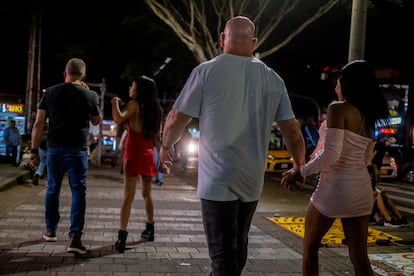Medellín declares war on sex tourism after US citizen found with two little girls at a hotel
The city’s mayor Federico Gutiérrez announces the six-month suspension of sex work in the neighborhood El Poblado and limits operating hours of the bars and clubs in the area, in which he says sex trafficking is taking place


The first repercussions of the discovery of a U.S. citizen with two girls, aged 12 and 13 respectively, in a luxury hotel in Medellín’s El Poblado neighborhood were announced on Monday. At a press conference, Mayor Federico Gutiérrez said that he would be signing two decrees: one, prohibiting sex work in the area of Medellín for six months, and another, the enforcement of a 1 a.m. closing time for bars in the area for a month. According to Gutiérrez, Lleras Park, the center of a neighborhood that is home to many nightclubs and restaurants patronized by foreign tourists, has become a magnet for crimes related to human trafficking, the drug trade and sexual abuse of minors.
In Colombia, sex work is neither illegal nor penalized, as indicated by the Constitutional Court’s case T-629. Still, Gutiérrez says he is acting under extraordinary circumstances, given the urgency of fighting back against the mafias that he says run El Poblado. On Monday, the mayor said: “We can’t prohibit sex work, but we can take care of those who provide services with the understanding that today, the area is under the control of various criminal organizations.”
Gutiérrez continued: “This situation has hit bottom. It is a serious, difficult situation.” He also announced that there would be meetings with owners of bars and hotels to clarify new “rules of the game”. Establishments that do not comply with the rules, added the mayor, will not only be subject to closure, but also to a possible termination of ownership rights. Gutiérrez’s announcement has aroused concerns that such a prohibition will not be effective in containing sex work, and that there is a possibility that problematic activity similar to that which has been taking place in El Poblado will continue in other parts of the city.
Last week’s case of the U.S. citizen has aroused indignation from Colombians and once again put a spotlight on the problem of sex tourism and its linked exploitation of children. The man, who has been identified as Timothy Allan Livingston, was discovered thanks to an individual who alerted the police that he was with the two girls at the Gotham Hotel, which is located nearby Lleras Park. Although he was arrested and detained for 12 hours, authorities eventually released him because he had not been caught in the act of sexually abusing the girls. He was released on Friday, and boarded a flight to Fort Lauderdale, Florida. An image of his passport, including his data and photo, has been posted to social media after details of his case came to light.
The El Poblado neighborhood, where the hotel in which Livingston was arrested is located, is an area of the city in which thousands of tourists can be found every night. It is full of bars, restaurants and hotels whose prices put them far out of reach for the average Colombian, and in which laws governing sex work are routinely disregarded. The Gotham Hotel’s website, which is presented entirely in English, offers three-story luxury apartments and a penthouse. In a line written in fine print at the bottom of the website, the establishment claims, “Gotham rejects the exploitation, pornography, and sexual tourism involving children and adolescents.”
After learning of the case, Medellín authorities ordered a 10-day closure of the Gotham. Mayor Gutiérrez, nonetheless, advocated for more severe measures, saying that the hotel should undergo a process to consider the revocation of its ownership rights, an idea that he repeated on Monday. “This single episode, which demonstrates the existence of sexual exploitation of children and adolescents, should be sufficient cause to apply termination of ownership rights. A mere 10-day closure is ridiculous,” announced the mayor. Radical feminist collectives like the Red Abolicionista de Medellín (Medellín Abolitionist Network) have called for a sit-in on April 9 at 6 p.m. to protest the exploitation of minors and women.
On Sunday afternoon, the city announced that it had assigned an official from the Center for Comprehensive Care for Victims of Sexual Abuse (Caivas) to determine whether Livingston had been involved in “criminal conduct related to inducing sexual practices” with the two girls in Medellín. Depending on the investigation’s findings, the office will consider the possibility of initiating termination of ownership rights at the hotel where the events allegedly occurred.
Medellín’s shadowy tourism
Sex tourism is just one side of a larger and more complex issue. In recent months, there have been several cases of U.S. citizens who have died amid suspicious circumstances in the city. In January, U.S. authorities advised travelers to avoid using dating apps such as Tinder, Grindr and Bumble in Medellín after several cases of varying severity in which U.S. citizens were drugged, robbed and even murdered during encounters arranged through apps. “Numerous U.S. citizens in Colombia have been drugged, robbed, and even killed by their Colombian dates,” warned the U.S. embassy in a January 10 security alert.
According to U.S. authorities, last year there was an increase in reports of incidents related to the use of dating apps, which are often used to attract victims and rob them, whether through force or with the use of sedatives. The Antioquia capital has also been the site of problems arising from the union of rampant tourism and drug trafficking, and the transformation of certain areas of the city to suit the needs and desires of visitors, many of whom are foreigners.
Sign up for our weekly newsletter to get more English-language news coverage from EL PAÍS USA Edition
Tu suscripción se está usando en otro dispositivo
¿Quieres añadir otro usuario a tu suscripción?
Si continúas leyendo en este dispositivo, no se podrá leer en el otro.
FlechaTu suscripción se está usando en otro dispositivo y solo puedes acceder a EL PAÍS desde un dispositivo a la vez.
Si quieres compartir tu cuenta, cambia tu suscripción a la modalidad Premium, así podrás añadir otro usuario. Cada uno accederá con su propia cuenta de email, lo que os permitirá personalizar vuestra experiencia en EL PAÍS.
¿Tienes una suscripción de empresa? Accede aquí para contratar más cuentas.
En el caso de no saber quién está usando tu cuenta, te recomendamos cambiar tu contraseña aquí.
Si decides continuar compartiendo tu cuenta, este mensaje se mostrará en tu dispositivo y en el de la otra persona que está usando tu cuenta de forma indefinida, afectando a tu experiencia de lectura. Puedes consultar aquí los términos y condiciones de la suscripción digital.








































